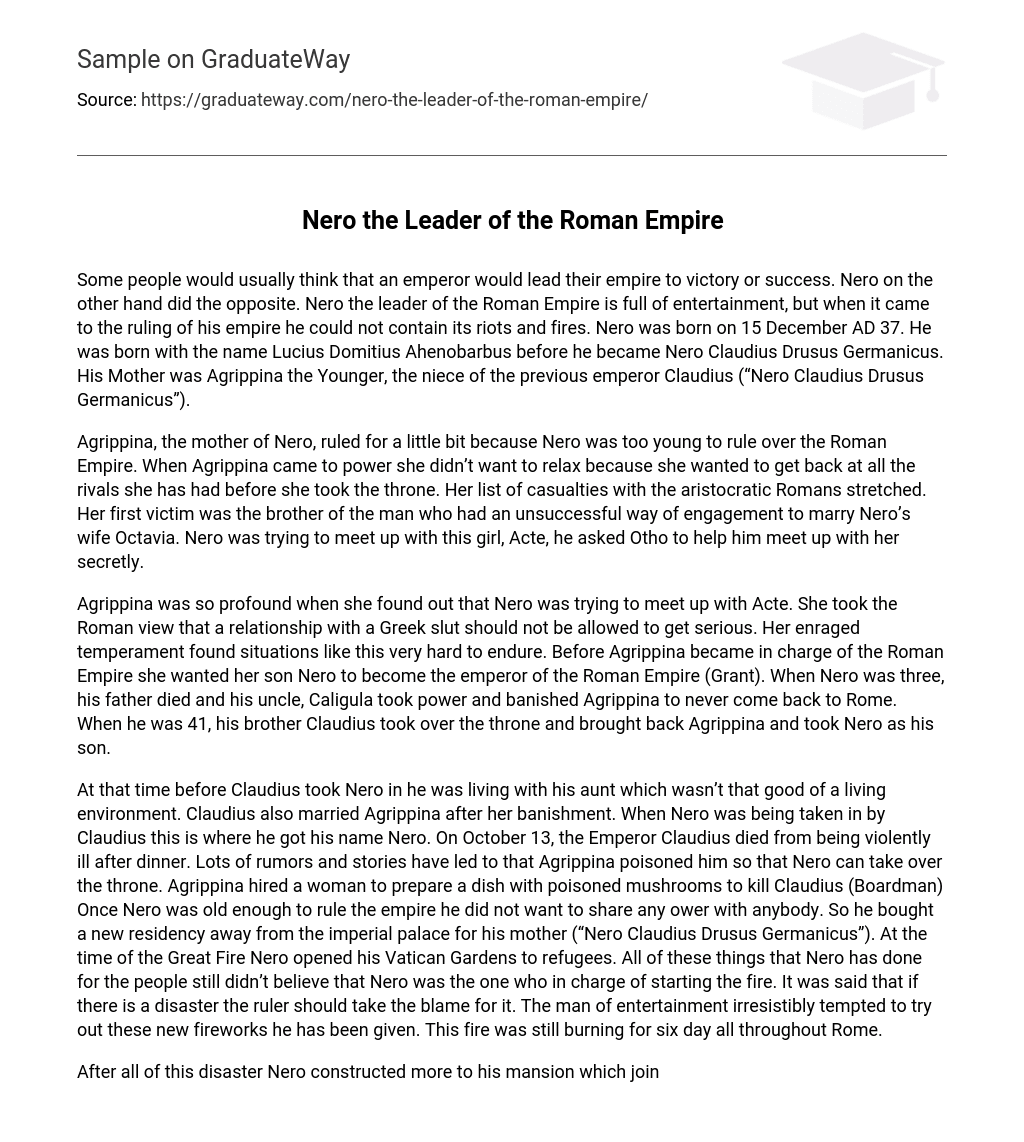Some people would typically assume that an emperor would guide their empire to triumph or prosperity. However, Nero, the ruler of the Roman Empire, went against this expectation. Full of entertainment, Nero struggled to control the riots and fires that plagued his empire. Nero was born on 15 December AD 37 as Lucius Domitius Ahenobarbus. Later, he adopted the name Nero Claudius Drusus Germanicus. His mother was Agrippina the Younger, who was the niece of the former emperor Claudius.
Agrippina, Nero’s mother, temporarily governed the Roman Empire while Nero was too young to rule. Instead of taking a break, Agrippina sought to take revenge on her rivals before ascending to the throne. Many aristocratic Romans fell victim to her vendetta. The first casualty was the brother of a man who had unsuccessfully pursued marriage with Nero’s wife Octavia. Nero, in his pursuit of Acte, asked Otho to assist him in secretly meeting her.
Agrippina was deeply upset to discover that Nero was attempting to rendezvous with Acte. She held the belief that a serious relationship with a Greek prostitute should not be tolerated according to Roman customs. Her furious temperament made it very difficult for her to tolerate situations like this. Prior to assuming control of the Roman Empire, Agrippina desired for her son Nero to become the emperor of Rome (Grant). When Nero was just three years old, his father passed away and his uncle Caligula assumed power, banishing Agrippina from Rome indefinitely. When Nero turned 41, his brother Claudius ascended to the throne and reinstated Agrippina, adopting Nero as his own offspring.
Before Claudius took Nero in, he lived with his aunt, which was not a favorable living environment. Additionally, Claudius married Agrippina after her banishment. It was during this time that Nero received his name. On October 13, Emperor Claudius died suddenly and violently after dinner. Numerous rumors and stories suggested that Agrippina poisoned him in order for Nero to ascend the throne. Agrippina even hired a woman to prepare a dish with poisoned mushrooms to kill Claudius (Boardman). Once Nero became old enough to rule the empire, he desired sole power and bought a new residence separate from the imperial palace for his mother (“Nero Claudius Drusus Germanicus”). During the Great Fire, Nero opened his Vatican Gardens as a refuge for the displaced. Even with all his efforts, people still doubted that Nero was responsible for starting the fire. It was believed that, as the ruler, he should take responsibility for any disasters. Being a man of entertainment, Nero couldn’t resist experimenting with the new fireworks he had been given. The fire continued to burn throughout Rome for six days.
After various calamities, Nero expanded his mansion to connect with the Gardens of Maecenas on the Esquiline. Additionally, he built a dome-shaped structure with halls designed in the shape of a Greek cross. He transformed his backyard, formerly a swamp where the Colosseum is now situated, into a vast lake. This lavish residence, known as the Golden House, was equipped with advanced technology, intricate machinery, and fascinating gadgets (Grant). Due to his passion for entertainment and artistic talent, Nero decided to showcase his skills in Greek theaters. He even participated in several Olympic games and achieved victory in some.
During Nero’s time in Greece, numerous distressing situations emerged, including executions. Gaius Petronius, the previous overseer of imperial pleasures, perished due to the prevalence of these executions. A significant number of senators, noblemen, and generals fell victim to these executions. Helius, who held the fort in Nero’s absence, had no alternative but to journey to Greece and bring him back for assistance. Unfortunately, upon Nero’s arrival in Rome, he discovered that it was too late as all governors had been instructed to resign. Moreover, the German troops refused to heed Nero’s authority.
Due to Nero’s lack of action in restoring his empire, he was condemned to death by the senate. However, instead of being killed by the senate, he chose to end his own life. Nero’s final words were “Qualis artifex pereo,” meaning “What an artist the world loses in me” (“Nero Claudius Drusus Germanicus”). The terror and horror that plagued the Roman Empire was not solely caused by Nero, but also by his mother, Agrippina. Despite Nero’s reluctance to share power, he and his mother formed a frightening duo, inflicting fear upon the magnificent city of Rome.





